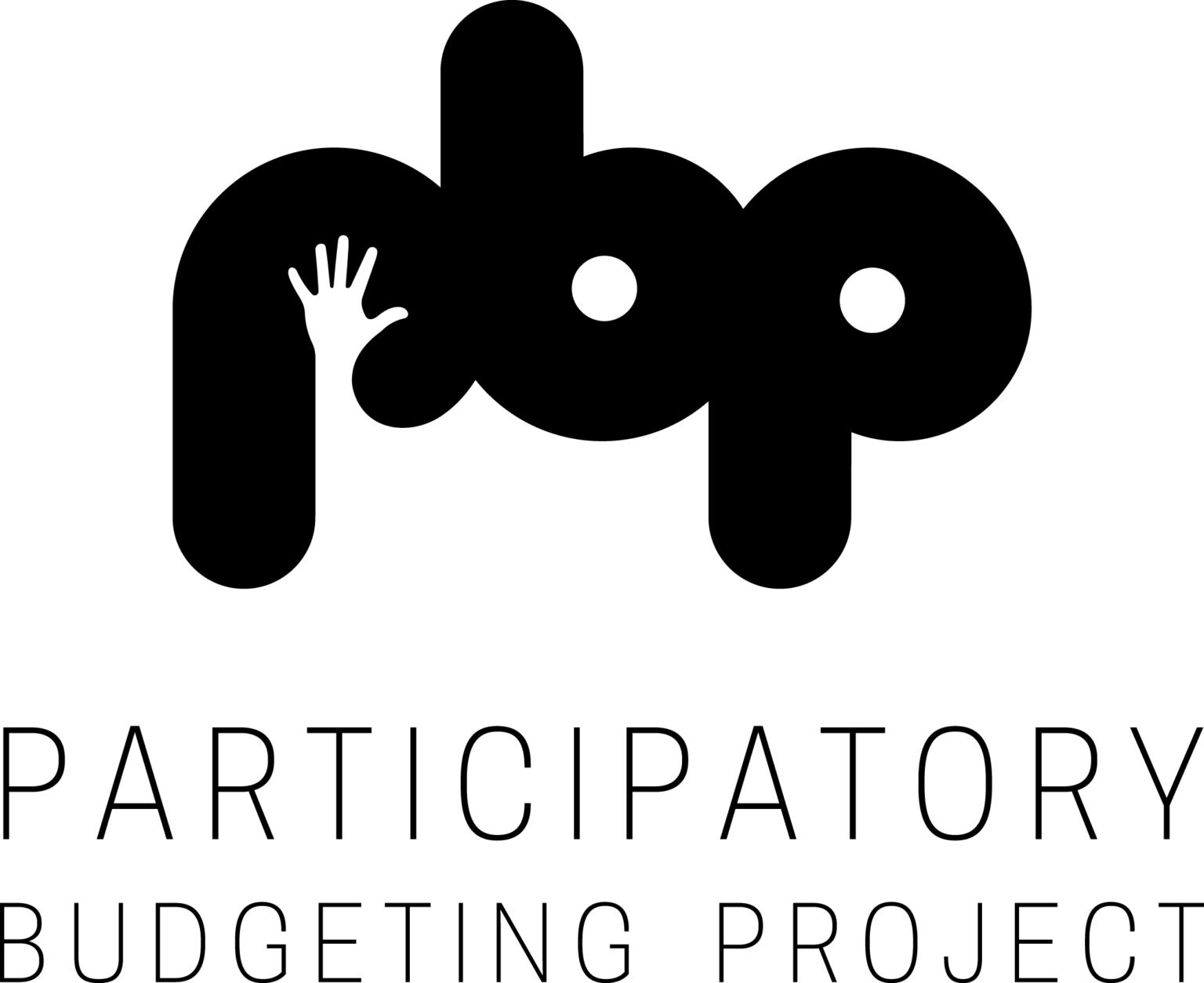Brotherhood-SisterSol (Bro/Sis) is an organization passionate about youth empowerment through community engagement and education. At Bro/Sis young people become independent leaders by addressing local socio-economic issues in their community of West Harlem, where only 42% of youth graduate from high school. They work with young leaders through their afterschool program, rights of passage program, environmental program, and study abroad opportunities. Bro/Sis focuses on guiding youth who have little access to educational and economic opportunities.
Bro/Sis members, Mariah and Rose shared their PB experience with us. Bro/Sis prepared them to be part of the city’s budgeting process and their greenhouse project won in PBNYC’s 2014-2015 cycle. It will be run by local youth and help their community have access to local and fresh food!
See what 14 year old Mariah and 19 year old Rose had to say!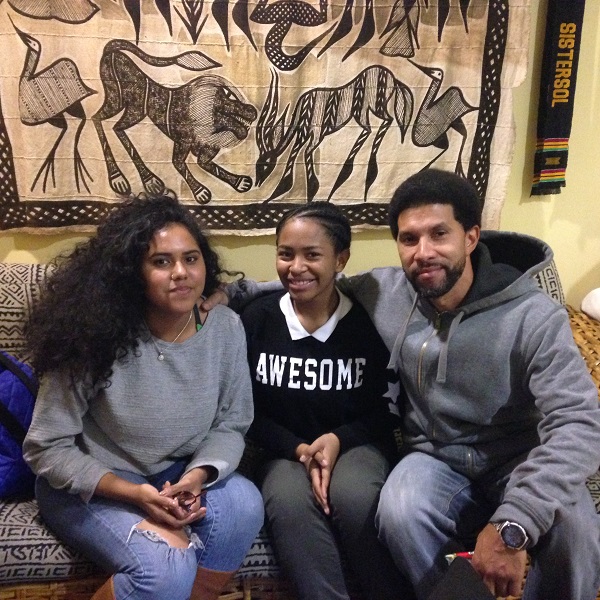
PBP: What is Bro/Sis?
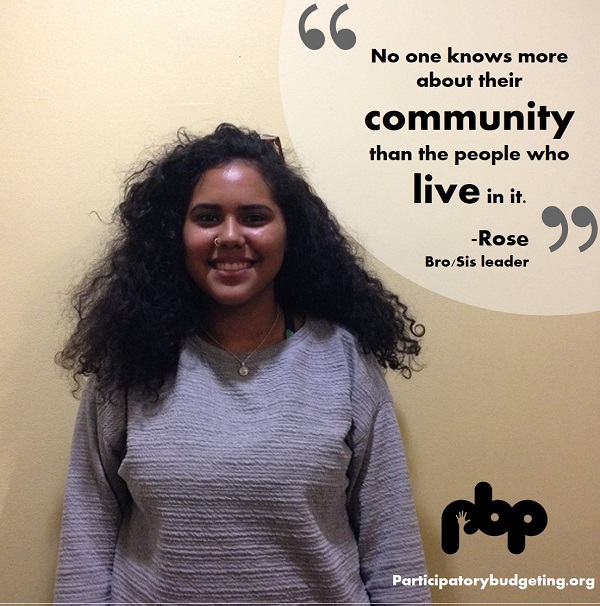 Rose: Rites of Passage is a gender specific program that centers around what it means to be a sister, woman and leader as well as a brother, man and leader. At Bro/Sis we have many programs that support youth in the community from ages 8-12 and teens from 13-18 years old. We have access to a computer lab and programs like writers collective, Hip/Hop Studio Class, Bro/Sis arts and an environmental program. These opportunities are great since there are a lot of teenagers and youth in our neighborhood and this program gives attention to those who want to better themselves.
Rose: Rites of Passage is a gender specific program that centers around what it means to be a sister, woman and leader as well as a brother, man and leader. At Bro/Sis we have many programs that support youth in the community from ages 8-12 and teens from 13-18 years old. We have access to a computer lab and programs like writers collective, Hip/Hop Studio Class, Bro/Sis arts and an environmental program. These opportunities are great since there are a lot of teenagers and youth in our neighborhood and this program gives attention to those who want to better themselves.
Mariah: Rose and I are part of the environmental program which includes the Gaia Renaissance program. This program works with youth to address environmental issues. We learn about food empowerment, sustainable community organizing around urban agriculture and actively maintain our community garden. We come up with solutions for the food insecurities our community faces. For example, we sell the fresh crops grown in our garden through our green market and during the summer, community members are able to pick crops for free. People are inspired by the fact that this program is run mainly by youth.
Rose: I’ve been in the Gaia Renaissance program for 4 years. In the summer and spring we get together to organize our garden and plant crops. We also build everything for the garden ourselves! I participate in the farmer’s market which is a youth-led process. It’s empowering learning how to run a business and interacting with the local community. Running a business, although hard, is not impossible. It fulfills this sense of leadership which is especially important to teenagers of color.
Mariah: Through the program, I’ve participated in workshops and went to conferences through our environmental 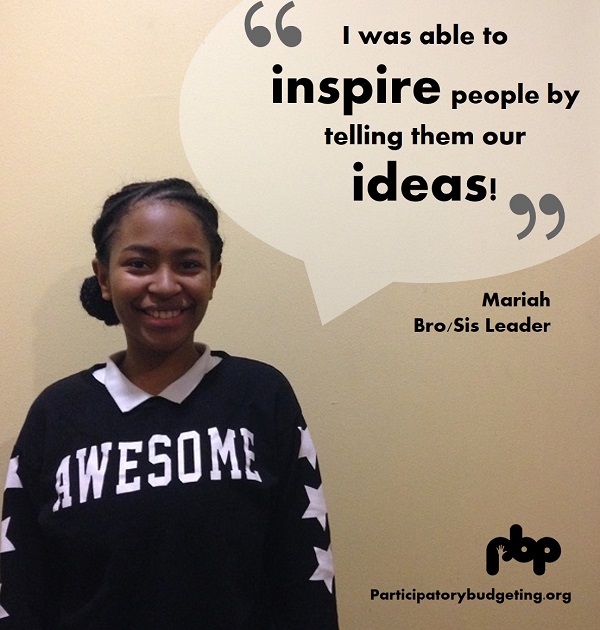 program. I’ve learned a lot about the issues my community faces. We live in a food desert and access to nutritious food is limited. We actively work to live sustainably in our community and encourage people to recycle and be environmentally conscious. After learning about rainwater harvesting in one of our workshops, I was able to share what I learned with my peers. Following our discussion, we built 2 rainwater harvesting systems for the garden. I’ve learned to grow together and unite as a community by taking direct action in community development.
program. I’ve learned a lot about the issues my community faces. We live in a food desert and access to nutritious food is limited. We actively work to live sustainably in our community and encourage people to recycle and be environmentally conscious. After learning about rainwater harvesting in one of our workshops, I was able to share what I learned with my peers. Following our discussion, we built 2 rainwater harvesting systems for the garden. I’ve learned to grow together and unite as a community by taking direct action in community development.
PBP: What is PB for you?
Rose: PB is about bringing more power to the community and letting people have a voice on what happens in their community. No one knows more about their community than the people who live in it! People know what needs to be fixed and can vote/rally around projects that serve their needs.
Mariah: Within a district, people get to pitch ideas that will be equally beneficial to the community. Everyone can vote to make it happen! It’s a process based on the people’s free will to improve their neighborhood. People campaign their ideas and gather community members to vote on them so the City can implement winning projects.
PBP: How did PB open opportunities for deepening your work in your neighborhood?
Rose: We developed a project to improve and expand our greenhouse before we learned about PB. Building our greenhouse would be a big step towards expanding our garden to grow crops year round. It would also bring more opportunities for our green market. We know our community doesn’t have access to healthy food options so we needed to introduce fresh food in our community. We would also use it as a space for community events, movie nights, etc. The project is basically a mini-building that will hold activities for all ages and get people from different cultural backgrounds into a unified space.
Mariah: Since we had access to more resources through PB, we were able to expand on our ideas for the greenhouse. We were able to include some of our even bigger ideas like the projector, the chairs, the hydroponics and aquaponics, etc.
PBP: What skills did you use to help your project win?
Rose: I’m not artistic but I’m good at articulating my ideas and conveying a message. I was able to use the communication skills I learned from the farmers market and group work I’ve participated in to confidently tell people about this project. It was fulfilling to practice the skills I’ve learned as a leader!
Mariah: I was able to creatively contribute to developing and building our greenhouse model for the PB expo. Even though I don’t consider myself to be an artistic person, I enjoyed being artistic and working with my peers. We were the only ones to have an actual model of our project and I felt like that made us stand out. I took a lot of pride in the outcome of our group effort.
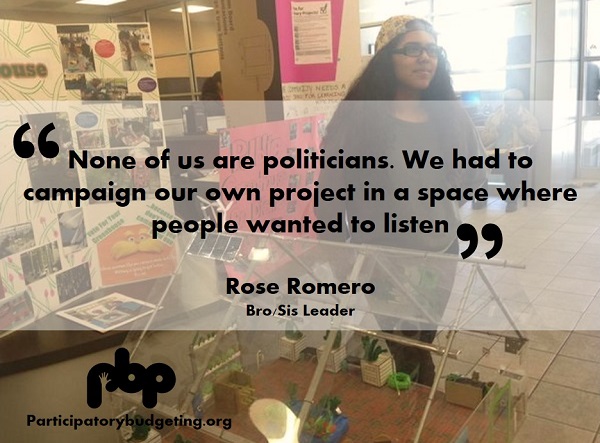
PBP: What does it feel like to participate in PB?
Rose: This process was refreshing and new. We knew about grants before but this was different because we were going to get assistance with developing the actual project being funded. None of us are politicians, we had to campaign for our own project in a space where people wanted to listen. A majority of our population consists of teenagers from diverse backgrounds and PB is a valuable outlet for our diverse and young voices to be heard. During the project expo, we took our model of the greenhouse and spoke to people about our vision for this project. It was interesting telling people our ideas, especially if it was new, and seeing how quickly they supported us. The large PB budget also enabled us to talk about useful and innovative tools we wanted to implement in the greenhouse. Everyone participated in this process and pitched their ideas for what they wanted to see in the greenhouse. It truly was a participatory process for us.
Mariah: The PB process felt like a fair opportunity to better not only Hamilton Heights but most of West Harlem and anyone who visits us. I would want to do this again! Having the support from fellow community members as well as members from City Councilmember Mark Levine’s office helped us feel represented as leaders in our community. The garden space is a place for everyone to gather. During the summer we have community BBQ’s and the patio is a place where the elderly enjoy the view of the pond, also built by us! It feels good working on a project that gives the community a place to bond.
PBP: How has participating in PB changed the way you’re seen in your community?
Rose: I feel like my role in the community grew and has become visible since this is a tight-knit community. People are respected for their positive actions. Sometimes among the elderly, it is easy for them to assume that teenagers aren’t doing anything productive. When community members see teenagers actively participating in society, they are willing to give youth more leverage in the community.
Mariah: My role in the community became stronger and I was able to inspire people by telling them our ideas and sharing them with a wider audience. After my experience with PB, I feel that I have a bigger responsibility to convey what we accomplished and learned through the combined efforts of PB and Bro/Sis. I would like to tell the community what PB is really about.
PBP: Who’s PB for?
Rose: Everyone should definitely come out and vote. It’s as simple as having an idea and pitching it. It’s also important to follow through your idea which I believe is one of the reasons people voted for our project. We worked hard and were always present for group meetings. People saw how passionate we were and from that, we were able to implement our project!
Mariah: It’s for everyone, especially people who want to improve their community. Even if you don’t win the money for your project, you can always try again the following year and attract more people to vote!
PBP: What would you like to see for PB in the future?
Rose: I want more people to know what PB is all about! Some people don’t know about PB and it’s important to get the word out. Also, I don’t think I saw enough schools engaging with PB and I would like to see more student involvement in future processes.
Mariah: I want to see more engagement from our local public officials with the community. Towards the end of the PB process, officials from our City Councilor’s office visited our organization and asked us what we wanted to see in our community, aside from our greenhouse project. From there we were pitching many ideas and it felt good to be heard.

